Israeli tech firm Sight Diagnostics recently nabbed initial clearance by the US Food and Drug Administration (FDA) for its lab-grade blood testing system that can conduct a full blood analysis with just a few drops of blood, instead of vials obtained intravenously. If this technology sounds familiar, it is because it was the general idea behind Theranos, the American biotech firm that closed up shop in 2018 with its founder, Elizabeth Holmes, now facing 20 years in prison for fraud and conspiracy to commit fraud.
Founded in 2011, Sight Diagnostics has been dubbed the anti-Theranos since it has so far lived up to its promise of revolutionizing blood testing. Where Theranos engaged in posturing, Sight has quietly been working to develop technology that appears to actually deliver accurate blood test results from a small amount of blood.
“To anyone who has had to have blood drawn regularly and has had people root around in their veins, the idea of just a few drops of blood is a dream,” says Jon Medved, founder and CEO of OurCrowd, Israel’s leading global investment platform and most active venture investor. OurCrowd was an early investor in Sight Diagnostics and participated in the company’s most recent funding round.
“Sight is an example of the best of Israeli tech and what they are doing is rather extraordinary,” Medved tells NoCamels in a phone interview. “There’s a whole $50 billion healthcare industry they are set to disrupt.”
Theranos previously boasted that it would do just that and the comparison is inevitable.
At its height in 2014, Theranos was valued at $9 billion, had the backing of Henry Kissinger, George Shultz, and Jim Mattis, and ran partnership with Walgreens, the second-largest pharmacy chain in the US, and others to use its devices in stores. Holmes herself was named the youngest self-made billionaire in the world by US magazine Forbes.
SEE ALSO: Startup’s 10-Minute Blood Test Device Shifts Focus From Lab To Doctor’s Clinic
Theranos’ device, the Edison, was supposedly designed to conduct over 200 blood tests, including a CBC (Complete Blood Count) – one of the more useful tests a physician can conduct – STD tests, drug tests, among many others.
Holmes would maintain that the Edison could perform a full blood analysis with “with a few drops of blood from just a prick of the finger,” and she would use this line in every talk and every appearance, promising a revolution in healthcare and blood testing.
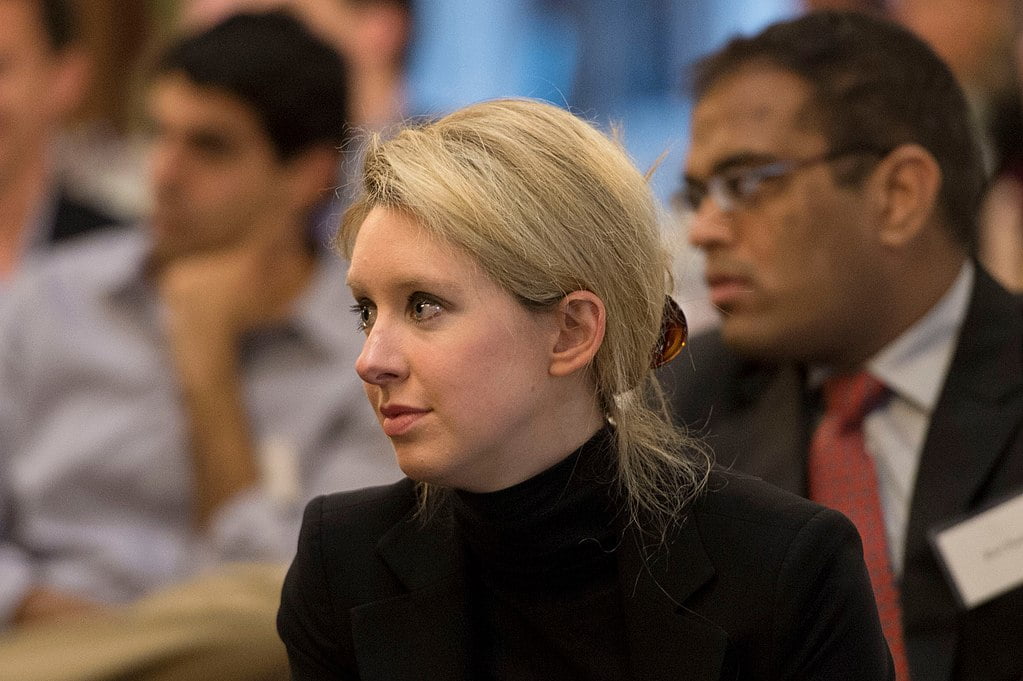
The act worked for over a decade, from the time Holmes famously dropped out of Stanford at 19 and used her tuition money as seed funding for Theranos in 2004.
Then came a 2015 Wall Street Journal exposé by Pulitzer Prize-winning journalist John Carreyrou based on a months-long investigation that opened the floodgates on the massive fraud behind Theranos. The piece relied on whistleblower information questioning the veracity of Theranos’ claims as to the Edison’s capabilities and the accuracy and reliability of its results. A series of investigations by the Securities and Exchange Commission (SEC), the Centers for Medicare and Medicaid Services (CMS) and others followed, as well as several lawsuits.
Holmes and former Theranos president and CEO Ramesh “Sunny” Balwani are set to go on trial next summer. They are accused of defrauding investors, patients, and authorities.
The spectacular rise and fall of Theranos is documented in great detail in Carryrou’s 2018 best-seller “Bad Blood: Secrets and Lies in a Silicon Valley Startup,” which builds extensively on the WSJ piece and the insider information provided by the whistleblowers – Tyler Schultz, George Shultz’s grandson and a former research engineer at Theranos who was Carreyrou’s initial source, and Erika Cheung, an ex-Theranos lab associate who tipped off the CMS .
The saga is also the subject of the acclaimed podcast “The Dropout” and the HBO documentary “The Inventor” out this year.
How Theranos was able to keep up the deceit for over a decade is astounding. The combined works revealed that the Edison could conduct only a fraction of the tests Theranos said it could, routinely produced wildly inaccurate blood readings and required a much higher volume of blood than the touted “several drops.” Theranos also frequently used competitors’ technologies for its blood tests, concealing this practice from patients and partners.
Theranos only had one FDA clearance to run a blood test using its proprietary technology – a herpes test. After the company shut down in 2018, it was granted five US patents – all filed in 2015 and 2016 – over the course of this year, including its first for blood-testing.
Revolutionary blood testing with AI and two drops
Sight was established by a team that includes Harvard-trained biotechnologists, experts in AI, and instrumentation engineers, many of whom hail from world-renowned IDF technology units.
For several years starting in 2014, Sight leveraged its technology for computer-based diagnoses of malaria in just three minutes, in contrast to lab results, which can take up to two days. The company’s product, Parasight, was used in 24 countries across Africa, Asia, and Europe, and delivered over half a million malaria tests worldwide.
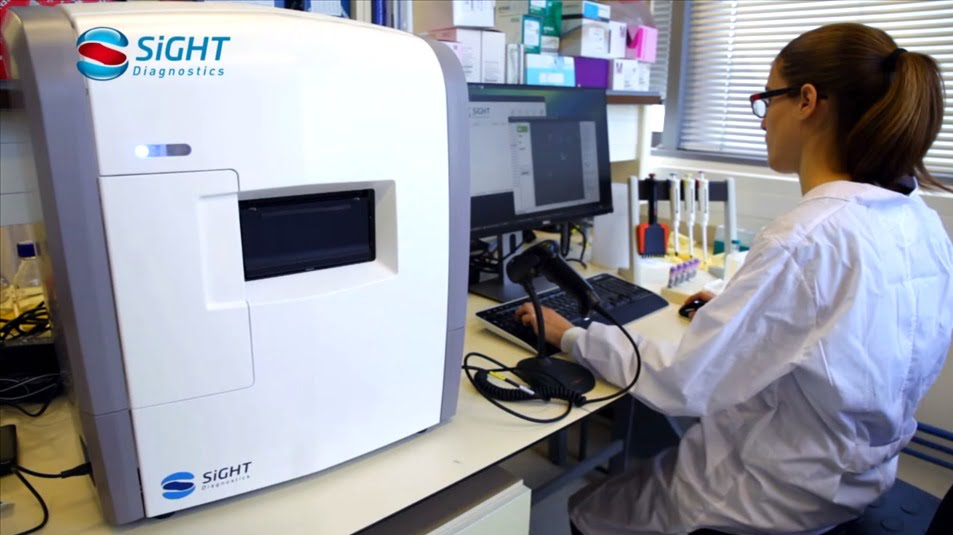
Sight’s system uses digital fluorescent microscopy and computer vision algorithms that visually scan and analyze the blood – relying on characteristics such as size, shape, fluorescence intensity, and morphology. It is essentially a digitization process of the blood made up of about 1,000 detailed images that are then interpreted by proprietary and fully automated algorithms. The process is faster, accurate and more efficient than the human eye, Sight says.
Sign up for our free weekly newsletter
SubscribeThe company then focused on developing the OLO, a blood testing analyzer that looks to be about the size of a coffee machine, which the company says could perform one of the most informative and vital blood tests, the CBC. Sight said the system would allow patients to receive blood test results within minutes at the point-of-care, and with a finger-prick and just two drops of blood.
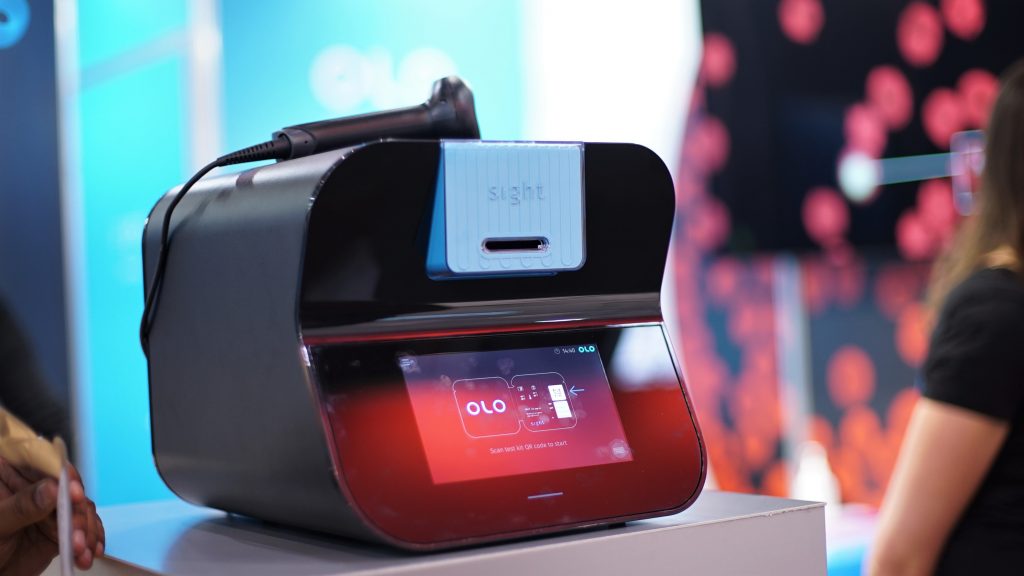
“After proving our technology in malaria detection, it became overwhelmingly clear to us that the CBC, the world’s most common blood test, is where we’d make the most impact,” Sarah Levy, Sight’s CTO, earlier this year in a statement. “The ability to create rich digital images of blood samples and analyze them in minutes has enormous potential to improve diagnostics and patient care.”
The OLO launched in Europe in the summer of 2018 after a clinical trial, which led to OLO’s CE Mark registration and approval for commercial sale in the EU.
This year, the company raised over $27 million in a funding round to pursue the technological and commercial expansion of the OLO and expand its menu of diagnostic tests.
And last week, it announced that the OLO has been granted FDA clearance following clinical trials at Boston Children’s Hospital, Columbia University Medical Center and Tricore Labs. The clearance enables OLO’s use in laboratories run by hospitals, diagnostic providers, and outpatient clinics.
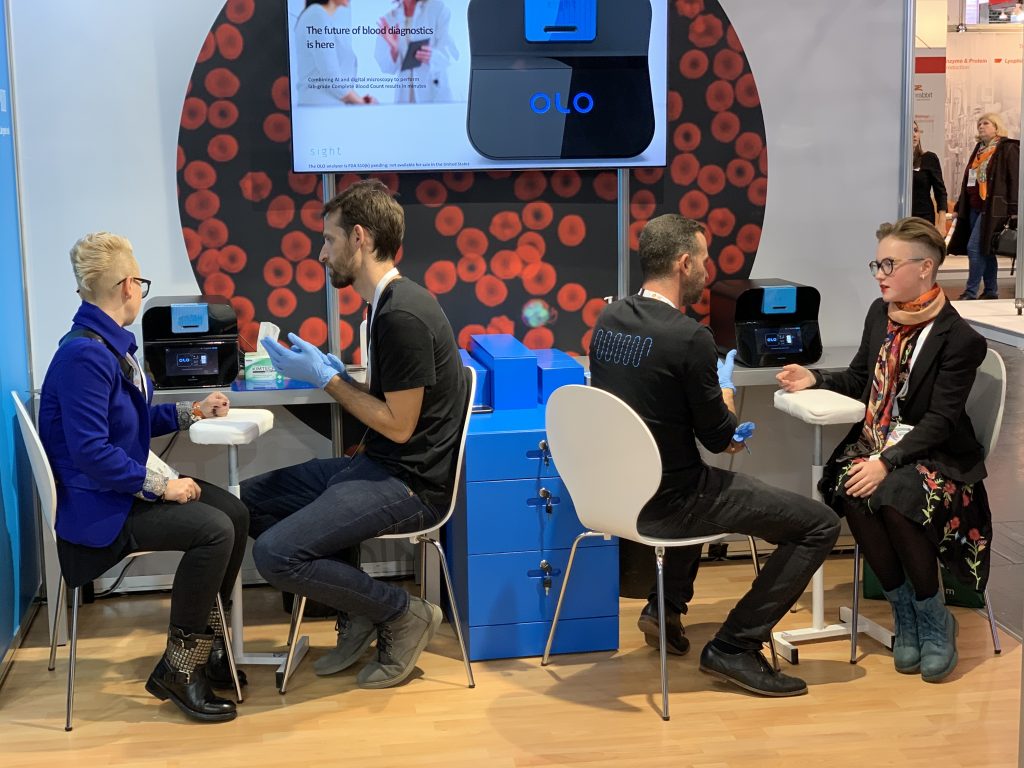
The FDA approval is a “big win for the company and for the world,” says Medved of OurCrowd.
“Sight has proven that it can achieve great things without being grandiose. They have been modest and humble and disciplined, and thorough and they have worked systematically for a huge breakthrough,” he tells NoCamels.
“Unlike certain companies that start with a T,” he jokes.
“Sight’s system, which learns and gets better and more accurate every day, will save lives and it will improve people’s lives,” Medved adds.
The OLO is currently being evaluated by Oxford University in both its Surgical Emergency Unit and Oncology Clinic, and by Miami’s Nicklaus Children Hospital.
“To treat children in our urgent care centers, a CBC is essential. OLO represents a major innovation in our laboratories’ CBC analysis: introducing finger-prick and venous sampling, five-part differential and flagging. It’s a truly welcome development,” said Dr. Steven Melnick, Chief of Pathology at Nicklaus Children Hospital, in a statement. “At current volumes, we believe OLO will substantially reduce our costs.”
SEE ALSO: Israel On Track To Launch The World’s 1st Underground Blood Bank
Sight says it also initiated a pharmacy pilot program with major UK chain Superdrug to bring blood testing to their health clinics and intends to pursue a CLIA waiver from the FDA to certify OLO for use in smaller practices and pharmacies in the US.
The company currently has six US patents with more pending.
“The years our R&D team spent solving complex engineering and design challenges have positioned us well to expand our offering in the future,” said Levy, Sight’s CTO.
“Our end-goal is to offer diagnostics for any disease with visible signatures in the bloodstream. We are confident Sight can continue to improve patient outcomes through new, faster, less costly, and more convenient testing,” she added.
Sight was named among six other Israeli firms to Fast Company’s list of “World’s Most Innovative Companies” for 2019.
Related posts

Editors’ & Readers’ Choice: 10 Favorite NoCamels Articles

Forward Facing: What Does The Future Hold For Israeli High-Tech?

Impact Innovation: Israeli Startups That Could Shape Our Future


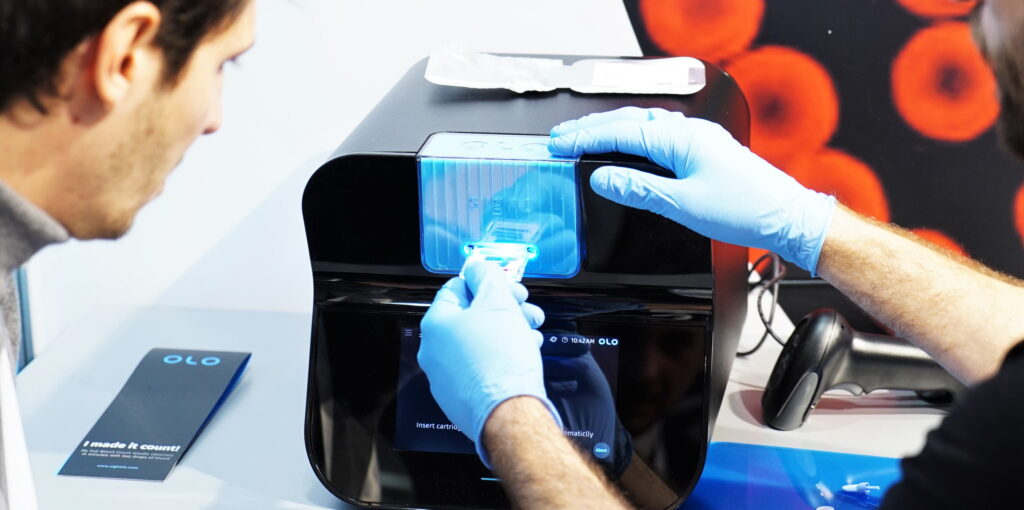

Facebook comments